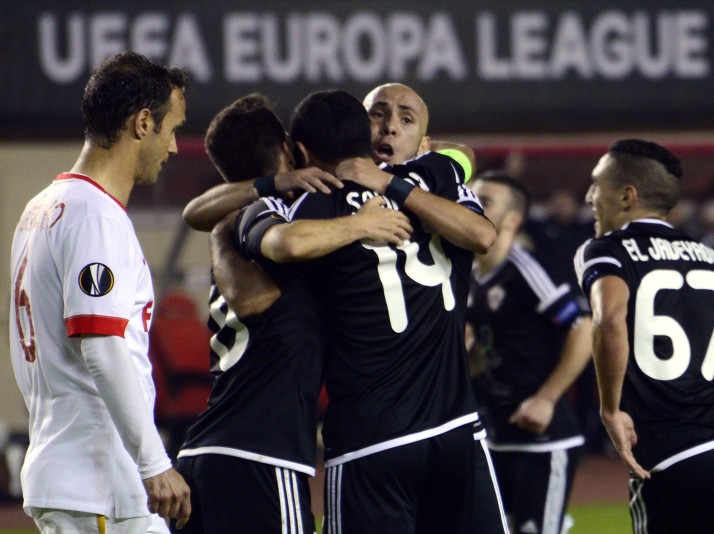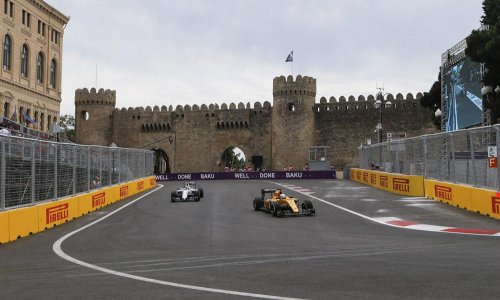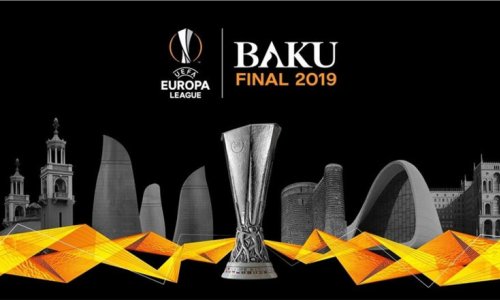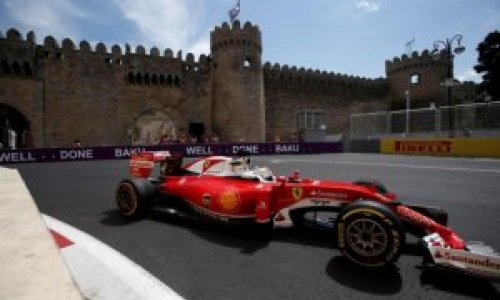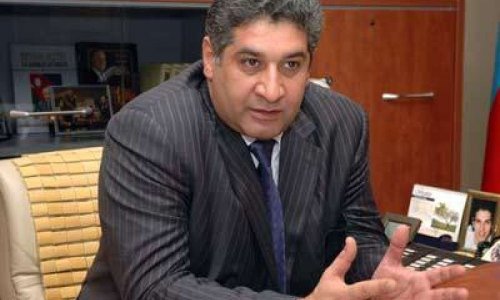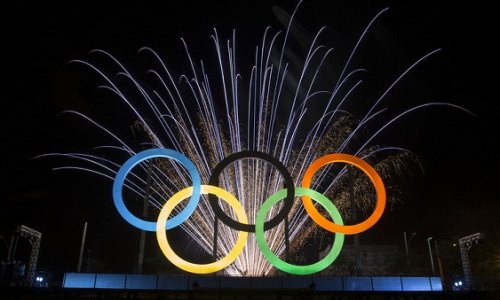By Thomas Goltz
As turkey-stuffed Americans slide down their couches for some post-Thanksgiving American "football” action this November 26, a hungry little real-world football team called the Qarabağ-Ağdam "Horsemen” will be squaring off against London’s storied Tottenham Hotspur Football Club in a Europa League Group match here in Baku, Azerbaijan — on the other side of the world.
It could be decisive. In Group J, Tottenham has seven points, as against AS Monaco FC with six, and four for Qarabağ, tied at the bottom with the Belgian team RSC Anderlecht. But should Qarabağ draw 1-1 with Tottenham (or even win!) and Anderlecht bring down Monaco (or merely come up with a nil-nil draw), all bets are off until the final matches on December 10, with Tottenham away to Monaco and Qarabağ at Anderlecht (if Brussels allows the game to take place, given the ISIL terror threat).
In other words, the race for the two teams to emerge from Group J to the next "knock-out” stage of the Europa League could be rivetingly close, and ultimately come down to the dreaded "aggregate.”
* * *
A year ago, the above paragraphs would have read as total gibberish to me.
A 61-year old "real ‘merican” guy from Montana, I was much more interested in huntin’ & fishin’ and the Green Bay Packers than a bunch of Euro-weenies playing that thing that we call soccer.
But that was before I first became acquainted with the unique (and violent) story of the refugee Qarabağ-Ağdam Horsemen and their incredible trajectory in Euro-football over the past two years — and also before I became equally obsessed with the baffling rules of the Beautiful Game.
A former war correspondent and post-Soviet Caucasus expert, I have become an Azerkesh — a fanatically devoted fan of the Qarabağ-Ağdam, nicknamed Atlilar (or Horsemen) — and have not only been inducted into the official fan club of chant singers and drum-pounders, but am also an honorary member of the team..
I have my own jersey, number 02, "T. Goltz”: 02 is the car license-plate number for the town of Ağdam. Minnesota Vikings? Denver Broncos? Green Bay Packers? Go to hell — you now no longer have an ounce of my loyalty.
And the reason for this shift in attitude away from all the over-paid and over-over-padded American footballers is actually pretty simple: Qarabağ-Ağdam, the hungry little "refugee team” from Azerbaijan (the only country in the world which borders both Russia and Iran), has the unique and dubious distinction of being the only registered international football club (FC) who have not been able to play a "home” game in more than 22 years.
This is sort of like the hallowed New Orleans Saints in its post-Hurricane Katrina diaspora in the 2005 season… Times 22.
Indeed, the saga of the Qarabağ-Ağdam Horsemen’s forced displacement is a little different from that of the Saints. The Horsemen’s last home game (in Ağdam) was played on May 12, 1993 — under incoming missile fire by invading Armenians at the hot end of the 1988-94 Karabakh War. For those who want to remember, the result was a 1-0 victory over a rival Azerbaijan Premier League team called Turan IK, from the town of Tovuz, which catapulted the Horsemen into the finals of the Azerbaijan Cup. They won that on an electric goal in overtime by Musfiq Huseynov, prevailing 1-0 over İnşaatçı Sabirabad FK.
But there was no celebration.
On July 23, 1993, the Horsemen’s home city of Ağdam fell to the invaders, and all the players rushed back to the war-stricken region to help their relatives extract family possessions and heirlooms before the city was looted and burned to ash.
Images I captured from the Internet circa 1993 show the gratuitous fire-gutting of newly captured Ağdam; the most recent images from 2014/15 show a "ghost-town” for specially vetted Armenian war-voyeur tourists to visit, including a "glory-wall” made up of hundreds of "trophy” 02 license-plates facing a newly-constructed war-voyeur hotel.
* * *
I won’t go on at any length about the ins and outs of the Azerbaijan-Armenia Karabakh conflict. Suffice it to say that around 1988, a heretofore marginal mountainous chunk of the Soviet Socialist Republic of Azerbaijan called the Autonomous District of Mountainous Karabakh began to agitate for its removal from Soviet Azerbaijan and to be included in Soviet Armenia. By the time of the collapse of the USSR in the autumn of 1991, both sides were gearing up for full-fledged conflict — and so it came to pass.
It was a bitter war, and way too often I was in the middle of it, and can cite too many names of places you have never heard of that were ethnically cleansed in the same style of better-known burgs in Bosnia (which was happening at exactly the same time, and thus got much better press attention).
Everyone with a heart knows about the Siege of Sarajevo, Tuzla and certainly Srebrenica in Bosnia. But what about Xodjali, Kelbajar and, finally, Ağdam, in Azerbaijan?
The war came, and the disorganized Azerbaijanis lost to the better-organized Armenians — and I was a frontline witness to it all. The misery list went (and goes) on and on — a constant Hurricane Katrina, as it were: 30,000 dead, four or five that number wounded and a million refugees, or IDPs (Internally Displaced People), including all the members of the Qarabağ-Ağdam Football Club.
But unlike the New Orleans Saints, who were able to return "home” after a mere year of internal athletic exile in 2006, the Qarabağ-Ağdam Horsemen have been obliged to wander from stadium to stadium across the blighted Azerbaijani landscape for over two decades.
And the team had been hit very hard by the war.
The QA-FC coach in wartime was Ağdam-native Allahverdi Bagirov, a former player himself. But in 1991, he dumped football, grew a beard and created his own militia to defend the city, often negotiating with a former Armenian fellow-Horseman player on prisoner and body exchanges. He was killed in a land-mine incident in the summer of 1992, possibly by the enemy Armenians, but equally likely by the head of a rival Azerbaijani militia.
Following the fall of Ağdam in July 1993, the Horsemen’s years of exile began — and the list of insults grew and grew.
The worst came in 1996-7. With no home stadium or significant financial resources, the Horsemen fought their way into Azerbaijan Premier League-winning position. By the logic of comparative aggregates, they needed to win their final match against Shemkir FC by three goals to win the championship — and did so, rolling like a stampede of wild horses over their foes (a fourth goal was ruled out as the referee had blown the final whistle seconds earlier).
I have the video footage of that game, including the official announcement with the Qarabağ-Ağdam players posing on the pitch: "This year’s national football champions in the Azerbaijan Premier League are the Qarabağ-Ağdam!”
But it was not to stand.
The then-head of the Azerbaijan Football Federation, Fuad Musayev, was a fan of the rival Neftchi Baku, the "Oilman’s” club, and decided to cook the numbers between the teams in a way that gave Neftchi the championship, thus stripping the league title — and the dream of playing in Europe — away from my Horsemen.
While everybody in Azerbaijani football knows about this scandal, no one wants to talk about it — and it was only when I found myself watching a faded, scratched 18-year-old VHS video that I discovered the cruel truth.
But meanwhile, back to the pitch…
* * *
In 2002, a local firm named Azersun took ownership of the Horsemen and began investing in the Qarabağ-Ağdam FC "project.” What was interesting about this was that Azersun’s money came from agriculture, and not from oil and gas, or other sectors of the famously corrupt Azerbaijani post-Karabakh war economy.
Hiring a cadre of foreign players to mix with indigenous refugees and a new coach — ironically, the star-player of the arch-rival Neftchi team, a gentleman named Qurban Qurbanov — the Horsemen began to raise themselves out of the morass of the "permanently displaced” to become, first, local and, then, international contenders.
And it was around that time I got to know the lads — traveling with the team to Milan, St. Etienne, and all over Azerbaijan by midnight bus. I stayed in the same hotels, eating their cafeteria food and generally hanging with them almost 24/7 — over a period of almost six months. It was my intention to make a film about the Horsemen, and they loved the idea.
There was the captain, Rashad Sadyqov, who it turns out is a refugee, or IDP, from a place called Kelbajar, which fell to the invader on April 1, 1993; there was Qara Qarayev, a kid from Fizuli, who learned how to play football in a Baku "refugee settlement” on a pitch made of cement after getting evacuated before the August 23, 1993 enemy occupation of his town; there was Namiq Yusifov, a sushi-eating guy from St. Petersburg in Russia, whose family was from Ağdam, and who spirited him away from grandma’s house before the city fell; and finally, there was Vugar Nadirov, whose father Elshad, was a local "biznisman” who specialized in the lucrative sale of automotive spare parts and used his fortune to create his own militia (of which he was the self-declared "general”), and who was killed defending his hometown on the day that the city fell on July 23, 1993.
Who were these guys? And who was I, who knew (at the start) almost nothing of the game they played so well, and with such devotion?
At a certain point, I started to think of myself in George Plimpton terms — the wannabee Detroit Lion "Number Zero” who first insinuated himself into that team to write his iconic "Paper Lion” and then had the audacity to believe he could actually play with them — until the real Lions’ linebacker monsters squashed him down to size.
Me? Train with the Qarabağ-Ağdam Horsemen? I am exhausted even watching their warm-ups! And increasingly, I am feeling less like a new George Plimpton and more like a cartoon character such as "Roy of the Rovers,” about a very ordinary English bloke who kicks the winning goal for his fantasy team…
And whether pseudo Roy of the Rovers or fake George Plimpton, at least I knew who I really was when introduced to the deeply layered saga of the Qarabağ-Ağdam refugee football team: At bottom, I was merely an expedient replacement for the team’s most devoted fan of all — a curious Dutch academic named Arthur Huizinga, who had clued me in to his obsessions when I was oblivious to the very existence of the team.
So back to the Horsemen’s story…
* * *
On May 7, 2014, the Qarabağ-Ağdam team took their first Azerbaijan Premier League championship since 1993 (aside from the one stolen from them), and then managed to rise to the Olympian heights of the Group stage of the 2014-15 Europa League, playing against such football giants as Ukraine’s Dnipro, the French Saint-Étienne and the mighty Inter Milan of football-obsessed Italy.
Thanks to Arthur, I had been traveling with them all the way, witness to the Horsemen’s rise upward and into the knock-out phase of the Europa League 2014-15 title, which would finally put Qarabağ-Ağdam on the world football map!
The finale was set for the do-or-die match against Inter Milan in Baku’s Tofiq Bahramov stadium on December 11, packed with dignitaries, my fellow fans and even a batch of Karabakh war-veterans, all come to cheer this unique team into further glory. The Horseman had to win to progress to the next stage. A draw "on aggregate” would not do.
Official time closed at nil-nil.
But at minute 90 + 3 in overtime, Richard Almeida (a Brazilian on the Qarabağ-Ağdam team) slammed in a deflected goal for a 1-0 victory!
Then, with 32,000 fans all up in the air and delirious with joy (including me) the Czech linesman lifted his flag to call an off-side that clearly was not — and was even declared by the Italian media as being "the stolen goal of the century.”
I could only weep along as the clock ticked off the last 30 seconds to call an end to one of the most remarkable journeys in modern football: the Qarabağ-Ağdam Horsemen’s miraculous gallop through the 2014/15 football season.
It seemed to be consigned fate.
Stolen goal; stolen land — stolen glory.
* * *
But now the Horsemen are back, and in Group J of the 2015-16 Europa League qualifying stage, once again with hopes of rising to the knock-out round if only they can draw or beat the mighty Spurs this November 26 in Baku (and Anderlecht dispatch or draw with Monaco.)
It is called "the aggregate,” and all that. It’s mathematical quicksand with the promise of redemption.
Could Borussia Dortmund be next? Or SK Rapid Wien? Maybe even FC Lokomotiv Moskva?
Ride, my Horsemen, ride!
Yes, I have become one of them — an international football fanatic, crunching numbers and statistics like breakfast cereal along with the world’s 2 or 3 billion ardent devotees of the Beautiful Game.
And guess which channel I will be tuned to this American Thanksgiving?
Sorry, Saints… I’ve got a new team.
NOTE: Thomas Goltz, the author of "Azerbaijan Diary” (M.E. Sharpe, 1998/99) and "Chechnya Diary” (St. Martin’s Press/Tom Dunne, 2003), is an American commentator on Turkic politics and history. He is finishing a film on the Horsemen of Ağdam, called "On Aggregate.”
www.ann.az
Follow us !

